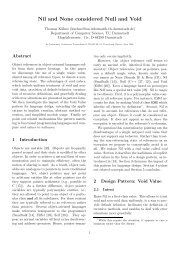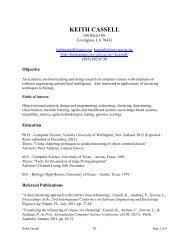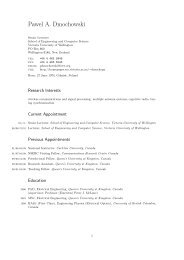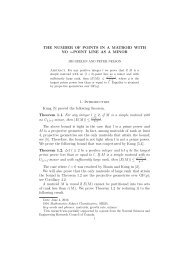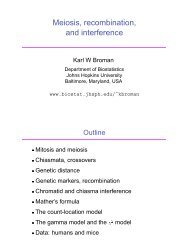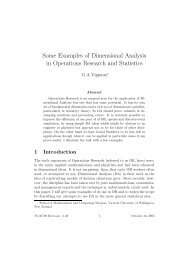Immutability - ECS | Victoria University of Wellington
Immutability - ECS | Victoria University of Wellington
Immutability - ECS | Victoria University of Wellington
You also want an ePaper? Increase the reach of your titles
YUMPU automatically turns print PDFs into web optimized ePapers that Google loves.
250 A. Potanin et al.<br />
run-time representation <strong>of</strong> the polymorphism. IGJ [10] and OIGJ [11] have both demonstrated<br />
that building on generic types provides a much nicer treatment for immutability<br />
parameterization completely removing the need for romaybe.<br />
5.2 IGJ<br />
<strong>Immutability</strong> Generic Java. (IGJ) is a language that supports class and object immutability<br />
and read-only references. Each object is either mutable or immutable, and each reference<br />
is Immutable, Mutable,orReadOnly. Inspired by work that combines ownership and<br />
generics [49], the distinctions are expressed without changing Java’s syntax by adding<br />
one new type parameter (at the beginning <strong>of</strong> the list <strong>of</strong> type parameters):<br />
1 // An immutable reference to an immutable date; mutating the<br />
2 // referent is prohibited, via this or any other reference.<br />
3 Date immutD = new Date();<br />
4 // A mutable reference to a mutable date; mutating the referent<br />
5 // is permitted, via this or any other mutable reference.<br />
6 Date mutD = new Date();<br />
7 // A read-only reference to any date; mutating the referent is<br />
8 // prohibited via this reference, but the referent may be changed<br />
9 // via an aliasing mutable reference.<br />
10 Date roD = ··· ? immutD : mutD;<br />
Line 3 shows object immutability in IGJ, and Line 10 shows read-only references.<br />
Java prohibits changes to type arguments, such as in Line 10, to avoid a type loophole.<br />
More detailed discussion <strong>of</strong> the Java language and type system is given by Bracha<br />
et al. [53] and Igarashi et al. [54]. Line 10 is legal in IGJ, because IGJ allows covariant<br />
changes in the immutability parameter. IGJ even allows covariant changes in other<br />
type parameters if mutation is disallowed, e.g., List is a subtype<br />
<strong>of</strong> List.<br />
IGJ satisfies the following design principles:<br />
Transitivity. More accurately, IGJ does not require transitivity. Rather, it provides a<br />
mechanism by which programmers can specify exactly where transitivity should be<br />
applied — and then that transitivity is enforced by the type system.<br />
IGJ provides transitive (deep) immutability that protects the entire abstract state <strong>of</strong><br />
an object. For example, an immutable graph contains an immutable set <strong>of</strong> immutable<br />
edges.<br />
C++ does not support such transitivity because its const-guarantee does not traverse<br />
pointers, i.e., a pointer in a const object can mutate its referent.<br />
IGJ also permits excluding a field from the abstract state. For example, fields used<br />
for caching can be mutated even in an immutable object.<br />
Static. IGJ has no runtime representation for immutability, such as an “immutability<br />
bit” that is checked before assignments or method calls. IGJ designers believe<br />
that testing at runtime whether an object is immutable [4] hampers program understanding.<br />
The IGJ compiler works by type-erasure, without any run-time representation <strong>of</strong><br />
reference or object immutability, which enables executing the resulting code on



